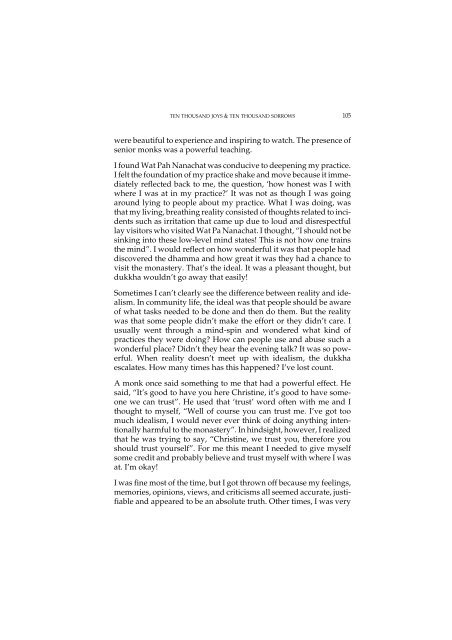Forest Path - Amaravati Buddhist Monastery
Forest Path - Amaravati Buddhist Monastery
Forest Path - Amaravati Buddhist Monastery
Create successful ePaper yourself
Turn your PDF publications into a flip-book with our unique Google optimized e-Paper software.
ten thousand joys & ten thousand sorrows 105<br />
were beautiful to experience and inspiring to watch. The presence of<br />
senior monks was a powerful teaching.<br />
I found Wat Pah Nanachat was conducive to deepening my practice.<br />
I felt the foundation of my practice shake and move because it immediately<br />
reflected back to me, the question, ‘how honest was I with<br />
where I was at in my practice?’ It was not as though I was going<br />
around lying to people about my practice. What I was doing, was<br />
that my living, breathing reality consisted of thoughts related to incidents<br />
such as irritation that came up due to loud and disrespectful<br />
lay visitors who visited Wat Pa Nanachat. I thought, “I should not be<br />
sinking into these low-level mind states! This is not how one trains<br />
the mind”. I would reflect on how wonderful it was that people had<br />
discovered the dhamma and how great it was they had a chance to<br />
visit the monastery. That’s the ideal. It was a pleasant thought, but<br />
dukkha wouldn’t go away that easily!<br />
Sometimes I can’t clearly see the difference between reality and idealism.<br />
In community life, the ideal was that people should be aware<br />
of what tasks needed to be done and then do them. But the reality<br />
was that some people didn’t make the effort or they didn’t care. I<br />
usually went through a mind-spin and wondered what kind of<br />
practices they were doing? How can people use and abuse such a<br />
wonderful place? Didn’t they hear the evening talk? It was so powerful.<br />
When reality doesn’t meet up with idealism, the dukkha<br />
escalates. How many times has this happened? I’ve lost count.<br />
A monk once said something to me that had a powerful effect. He<br />
said, “It’s good to have you here Christine, it’s good to have someone<br />
we can trust”. He used that ‘trust’ word often with me and I<br />
thought to myself, “Well of course you can trust me. I’ve got too<br />
much idealism, I would never ever think of doing anything intentionally<br />
harmful to the monastery”. In hindsight, however, I realized<br />
that he was trying to say, “Christine, we trust you, therefore you<br />
should trust yourself”. For me this meant I needed to give myself<br />
some credit and probably believe and trust myself with where I was<br />
at. I’m okay!<br />
I was fine most of the time, but I got thrown off because my feelings,<br />
memories, opinions, views, and criticisms all seemed accurate, justifiable<br />
and appeared to be an absolute truth. Other times, I was very

















